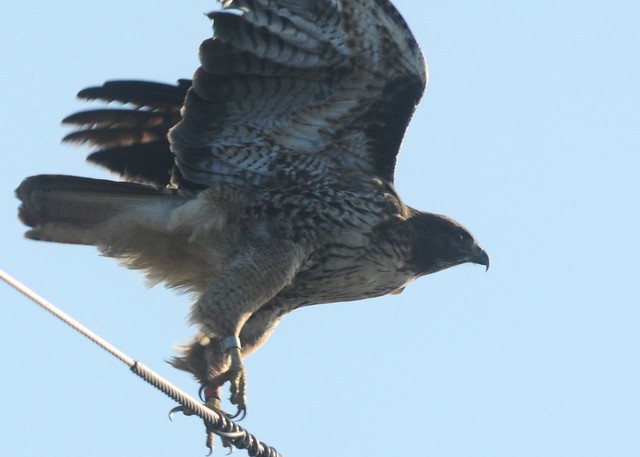 |
| The Raptor Center, University of Minnesota |
How It Happens:
 |
| Radiograph from Hunt et al. (2006) shows lead fragmentation in thorax of white-tailed deer killed by a standard copper-jacketed, lead-core, soft-point hunting bullet |
Unfortunately, while dining on the carcass, these birds will accidentally eat anything lodged in the meat, including the material left behind if the animal was shot. And if bullet used to kill the animal was lead (lead bullets tend to fragment into many pieces upon impact), the birds can end up eating lead with their breakfast.
 |
| Lead shot in a Bald Eagle's gizzard (biological diversity.org) |
Because lead is toxic! Remember how you aren't supposed to lick lead paint? Well, same goes for eating lead bullets. In Bald Eagles, the largest raptors in the United States, it only takes a piece of lead the size of the tip of a pencil to cause lead poisoning. Now think about a fragmented lead bullet, and how much lead could be left behind in an Elk carcass, and how much of that lead could make it into an eagle's system with one beak-ful of food.
Once in the system, lead can affect the body by interfering with a number of processes, and by damaging many organs and tissues, including the heart, bones, kidneys, intestines, and nervous system. A bird suffering from lead poisoning shows signs of weakness, organ failure, impaired movement (especially use of legs), heavy breathing, confusion, and in severe cases, seizures and death.
Treatment:
At the RMRP, birds showing the above symptoms have their blood drawn to test for the presence of lead. If the results are positive, the bird is given doses of Calcium-EDTA, a compound that binds to lead in the system, and can then be passed out of the body in the urine. The process is called chelation. Usually, one round of chelation doesn't remove all the lead, so multiple rounds are given until blood levels are back to a reasonable value. While the bird is undergoing chelation, supportive care is given to keep the bird nourished, hydrated, safe, and comfortable. Unfortunately, lead poisoning can have chronic effects, and in some cases the bird never regains its full health.
 |
| Golden Eagle at the RMRP |
The two most significant ways raptors ingest lead are through lead bullets used for hunting (explained above), and lead weights used for fishing: lead weights often fall off fishing lines, or are left on discarded line. The sinkers then fall to the bottom of the stream or pond, where they are accidentally ingested by ducks and other bottom-feeding waterfowl, or by waterfowl looking for stones for their gizzards. The waterfowl then get sick and die, and are scavenged by raptors, or they are killed by a raptor while ill. Either way, the lead eventually makes its way into the raptor.
As a hunter, and depending on your location in the world and within the United States, you can consider not using lead bullets. Copper and steel alternatives are available, and while copper is a little more expensive than lead, it doesn't have the potential side effect of killing more animals than you intended. If the higher price is the only deterrent in your situation, please think about the money saved by using a lead bullet instead of a copper bullet, then think about the value of the lives lost by ingesting that same lead bullet--perhaps the more expensive bullets will be worth it. More information on non-lead bullets here.
Fishermen, you can save lives by not using lead sinkers. Non-lead alternatives are widely available. You won't just be saving raptors, you'll be saving ducks and loons and all manner of other water birds. More information here.
The Good News:
 |
| Sub-adult Bald Eagle at the RMRP |
______________________________________
We've admitted three lead-positive eagles with already this year, and it's only February! Please help us save these birds and all the other 250+ raptors we admit each year by donating here.
Want more science? Here's is a literature review on the impacts of lead on the environment produced by the Minnesota Department of Natural Resources.
Interested in lead-related legislation? Check out this site.
Don't forget to follow the RMRP on Facebook and Twitter. Also, check out our official website.







